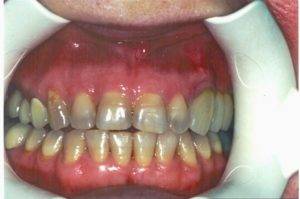Gum disease is an extremely common oral health condition: most adults experience preliminary symptoms of this disease at one point in time, although good oral hygiene habits will keep the worst of the effects at bay.
Gum Disease: Gingivitis and Periodontal Disease
The origin of gum disease is plaque, the sticky substance deposited on teeth and gums as a result of bacterial activity. Daily brushing and flossing removes plaque, but if it’s not removed, it quickly hardens into tartar, which is very difficult to get rid of with a toothbrush.
Preventing Gum Disease
The bacteria that form plaque feed on starch and sugar deposits on the teeth, which is why regular brushing and flossing is your first and best line of defense against gum disease. Twice-daily brushing with fluoride toothpaste, along with daily flossing, is the best strategy to remove plaque deposits before they are able to harden into tartar. Sometimes, even despite your best efforts, tartar can still develop on your teeth. Because tiny deposits of food become stuck in pockets between teeth or beneath the gum line, they are difficult to detect and remove. Once tartar is present on your teeth the safest and most effective way of removing it is with a professional dental cleaning, so you can consider your dentist your second line of defense against gum disease. Even if your gums are in the early stage of disease, professional cleaning and tartar removal will reduce inflammation and help your gums and teeth to recover. Aside from oral hygiene, there are several risk factors to gum health. Smoking and diabetes, for example, have a negative effect on gum health because they contribute to poor circulation and increase infection risk. Another risk factor is low saliva levels, which can be caused by certain medications; chewing gum after meals can help stimulate saliva flow. South Bay Dentistry & Orthodontics works to educate patients on oral health prevention. to schedule an appointment and keep routine cleanings an important part of gum disease prevention.Tags: gum disease

